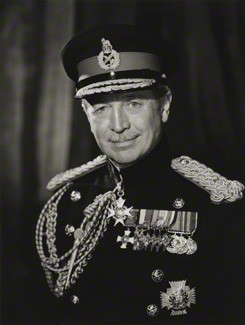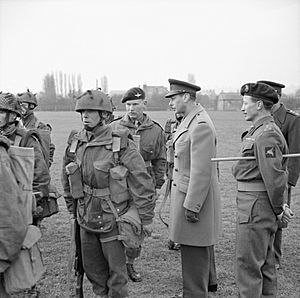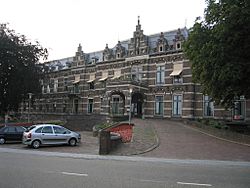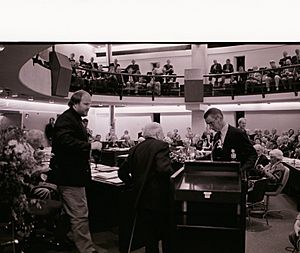John Hackett (British Army officer) facts for kids
Quick facts for kids
Sir John Winthrop Hackett
|
|
|---|---|
 |
|
| Nickname(s) | "Shan" |
| Born | 5 November 1910 Perth, Western Australia |
| Died | 9 September 1997 (aged 86) |
| Allegiance | United Kingdom |
| Service/ |
British Army |
| Years of service | 1933–1968 |
| Rank | General |
| Service number | 52752 |
| Unit | 8th King's Royal Irish Hussars |
| Commands held | British Army of the Rhine (1966–68) Northern Army Group (1966–68) Northern Ireland Command (1961–63) Royal Military College of Science (1958–61) 7th Armoured Division (1956–58) 20th Armoured Brigade (1954–55) Trans-Jordanian Frontier Force (1947–48) 4th Parachute Brigade (1943–44) |
| Battles/wars | Arab revolt in Palestine Second World War Palestine Emergency |
| Awards | Knight Grand Cross of the Order of the Bath Commander of the Order of the British Empire Distinguished Service Order & Bar Military Cross Mentioned in Despatches (6) |
| Other work | University administrator, author, commentator |
General Sir John Winthrop Hackett (born November 5, 1910, died September 9, 1997) was an Australian-born British soldier. He was also a painter, a university leader, and a writer. He was known for his bravery and intelligence throughout his long career.
Contents
Early Life and Education
John Hackett, who was often called "Shan," was born in Perth, Western Australia. His father, also named John Winthrop Hackett, was a newspaper owner and a politician. His mother, Deborah Drake-Brockman, came from an important family in Western Australia. Her sister, Grace Bussell, was famous for saving people from a shipwreck when she was a teenager.
John Hackett went to Geelong Grammar School in Australia. Later, he traveled to London to study painting at the Central School of Art. He then studied history at New College, Oxford. Since an academic career wasn't the right fit, he joined the British Army in 1933.
While training for the army, he continued his history studies. He wrote a paper about the Crusades, especially about Saladin's campaigns. He was also very good at languages, learning to speak French, German, Italian, and Arabic, and eventually became fluent in ten languages!
Family Life
John Hackett married Margaret Frena in Jerusalem on March 21, 1942. Margaret was from Austria. They had one daughter named Susan Veronica Hackett. John and Margaret remained married until his death, and Margaret lived for another ten years after him.
Early Military Career
Hackett's military career began in Palestine during the Arab revolt. He was recognized for his brave actions there in 1936. From 1937 to 1941, he served with the Trans-Jordan Frontier Force, where he was again honored.
Second World War Experiences

During the Second World War, John Hackett fought in the Syria-Lebanon campaign. He was wounded and received the Military Cross for his courage. While recovering in Palestine, he met Margaret Frena, who he later married.
He also served in the North African campaign. He commanded a tank squadron and was wounded again when his tank was hit. He suffered severe burns escaping the burning vehicle. While recovering, he helped create famous special forces units like the Long Range Desert Group and the Special Air Service.
In 1944, Hackett formed and led the 4th Parachute Brigade. This unit was part of Operation Market Garden, a major Allied attack in the Netherlands. During the Battle of Arnhem, Brigadier Hackett was badly wounded in his stomach. He was captured and taken to the St. Elizabeth Hospital in Arnhem. A German doctor thought his injuries were too severe to survive. However, a skilled surgeon named Alexander Lipmann-Kessel performed an amazing operation that saved Hackett's life.
After recovering a bit, Hackett managed to escape with the help of the Dutch underground resistance. Even though he was still very weak, the Germans were planning to move him to a prisoner-of-war camp. A resistance worker named 'Piet van Arnhem' drove him to the town of Ede. They were stopped at a checkpoint, but Hackett had extra bloody bandages put on to make him look even worse. Piet told the guards they were taking him to the hospital, and they were allowed to pass.
A Dutch family, the de Nooijs, hid Hackett in their home in Ede. They cared for him for several months until he was strong enough to escape back to Allied lines with the help of the underground. Hackett remained friends with the de Nooij family for the rest of their lives. He even wrote a book about his escape called I Was A Stranger in 1977. For his bravery at Arnhem, he received his second Distinguished Service Order.
Later Army Career
After the war, Hackett returned to Palestine in 1947 during the Palestine Emergency. He took command of the Transjordan Frontier Force. Under his leadership, this force was disbanded as the British left the region.
He continued his education, studying in Austria. After returning to the United Kingdom, he attended the Staff College, Camberley in 1951. He then commanded the 20th Armoured Brigade and later the 7th Armoured Division.
In 1958, he became the leader of the Royal Military College of Science. He was promoted to lieutenant-general in 1961. From 1961 to 1963, he was the General Officer Commanding-in-Chief for Northern Ireland Command. He was knighted in 1962.
In 1963, he moved to the Ministry of Defence. He was in charge of organizing forces and developing new weapons. He played a key role in changing the Territorial Army, which made him unpopular with some people.
In 1966, he was given command of the British Army of the Rhine (BAOR) and also NATO's Northern Army Group. His ability to speak many languages and his friendships with foreign soldiers made him a great choice for these important roles.
Retirement and Later Work
After retiring from the army in 1968, Sir John Hackett remained very active. He served as the Principal of King's College, London, a university, from 1968 to 1975.
In 1978, he wrote a famous novel called The Third World War: August 1985. This book was a fictional story about a possible World War III, imagining a Soviet invasion of West Germany in 1985. He followed it up with The Third World War: The Untold Story in 1982, which added more details from a Soviet point of view. These books were so influential that author Max Brooks said they inspired his novel World War Z.
Awards and Honors
Sir John Hackett received many important military awards for his bravery and service. These included the Knight Grand Cross of the Bath, the Commander of the Most Excellent Order of the British Empire, the Distinguished Service Order (with an extra bar for a second award), and the Military Cross. The Times newspaper, in his obituary, described him as a man of "intellect and prodigious courage."
|
Here are some of his main awards:
| Knight Grand Cross of the Order of the Bath (GCB) | 1967 | |
| Knight Commander of the Order of the Bath (KCB) | 1962 | |
| Companion of the Order of the Bath (CB) | 1958 | |
| Commander of the Order of the British Empire (CBE) | 1953 | |
| Member of the Order of the British Empire (MBE) | 1938 | |
| Companion of the Distinguished Service Order and Bar (DSO and Bar) | 1942 Bar 1945 |
|
| Military Cross (MC) | 1941 | |
| General Service Medal | with palm for Mentioned in Despatches Clasp 'Palestine' |
|
| 1939–45 Star | ||
| Africa Star | ||
| Italy Star | ||
| France and Germany Star | ||
| Defence Medal | ||
| War Medal 1939–1945 | with palm for Mentioned in Despatches | |
| Queen Elizabeth II Coronation Medal | 1953 |
Hackett was also mentioned in official reports for his bravery six times:
- 1936 Palestine
- 1937 "Trans-Jordan Frontier Force" (twice)
- 1944 Italy
- 1945 Arnhem
- 1949 Palestine
 | Kyle Baker |
 | Joseph Yoakum |
 | Laura Wheeler Waring |
 | Henry Ossawa Tanner |



